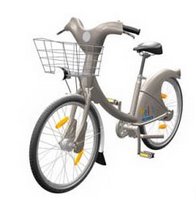Paris - Bikes for Rent

Memphis is topographically flat, an easy ride for bikers. So is Paris, and there renting Velib' bikes has taken hold as an inexpensive, stylish, and people-friendly way to get around the city.
In Memphis Midtown Bike has moved downtown (509 S. Main) and starting in April or May will offer bike rentals. Other cities are paying careful attention to Paris; San Francisco (yes, it is hilly there) will start a bike sharing program in 2009. Click below to read about the Velib' in Paris.
A New Fashion Catches On in Paris: Cheap Bicycle Rentals
By Steven Erlanger with Maia de la Baume and Basil Katz
New York Times, Published: July 13, 2008
PARIS — They’re clunky, heavy and ugly, but they have become modish — and they are not this season’s platform shoes.
A year after the introduction of the sturdy gray bicycles known as Vélib’s, they are being used all over Paris. The bikes are cheap to rent because they are subsidized by advertising, and other major cities, including American ones, are exploring similar projects.
About 20,600 Vélib’ bicycles are in service here, with more than 1,450 self-service rental stations. The stations are only some 300 yards apart, and there are four times as many as there are subway stations, even in a city so well served by its metro system.
In the first year, the city says, there have been 27.5 million trips in this city of roughly 2.1 million people, many of them for daily commutes. On average, there are 120,000 trips a day. And on July 27, at the conclusion here of the Tour de France, 365 lucky Vélib’ riders will be chosen to ride along for a while and cross the finish line.
There are a Vélib’ Web site, Vélib’ fashions and a Vélib’ blog ; one recent posting discussed the best way to ride with a skirt. A kind of Vélib’ behavior has emerged, especially at the morning rush, with people swiftly checking for bikes in the best condition: tires inflated, chains still attached, baskets unstolen.
Natallya Ghyssaert, a 34-year-old doctor, has an annual subscription for 29 euros (about $46), which lets her use a bike whenever she wants for 30 minutes at a time without extra charges. She uses a Vélib’ two or three times a day, saying, “I love it; you can see Paris, you can exercise and stay out in the light of day.”
The Vélib’ — a contraction of vélo for bike and liberté — can also be rented for a day or for a week, with a 150 euro (about $239) deposit taken from the user’s credit card if the bike is not returned. Usage fees over 30 minutes can rise steeply: two hours costs 7 euros (about $11). But 96 percent of all rides are less than 30 minutes, because bikes can be returned to any station.
No one knows quite how many trips by car or taxi are thereby avoided, but the “eco-friendly” nature of the Vélib’ has been much promoted in a country where juice companies warn of the risks to “our fragile planet” in lavish brochures on thick paper.
Benjamin Tomada, 30, a cook parking his Vélib’ near the Music Hall restaurant where he works, said: “I have a car but I don’t use it. It’s always better to take a bike than the metro.”
Still, there have been significant problems with traffic congestion and safety, vandalism and theft. At least 3,000 of the bikes have been stolen — nearly 15 percent of the total, and twice original estimates. Some have been seen in Romania or found in shipping containers on their way to Morocco.
Wearing helmets is not compulsory in France, and three people have died on their rented Vélib’s, hit by buses or trucks.
The Vélib’ program in Paris was conceived by the Socialist mayor, Bertrand Delanoë, and the 10-year contract was won by JCDecaux, a major French public relations and advertising company with good political contacts, after defeating a rival bid from Clear Channel.
The deal is supposed to be good for Paris, but it promises to be extremely lucrative over time for JCDecaux.
Decaux got to erect 1,628 billboards to rent; it invested nearly $142 million to set up the rental bike system and the billboards, and must provide maintenance and replace stolen bikes; the city of Paris gets the proceeds from the usage of the bikes plus some royalties from Decaux.
So far, according to Rémy Pheulpin, the company’s executive vice president, it has put up 1,500 billboards in a year and expects to make about $94 million a year from them. The company stands to begin turning a considerable profit if not next year, then in the third year of its 10-year contract.
The city has received $31.5 million from subscribers and users of the bikes, plus an additional $5.5 million a year, fixed in the contract, from advertising royalties, according to Céline Lepault, the Vélib’ project manager for City Hall.
Mr. Pheulpin, whose company built similar but much smaller programs in 10 other cities, like Lyon and Rouen, said the company had learned that there were several keys to success: allowing subscriptions, so people get the sense that the bikes are free once they have paid their up-front fee; making sure the bike stations are ubiquitous and keeping the system “user-friendly.”


<< Home